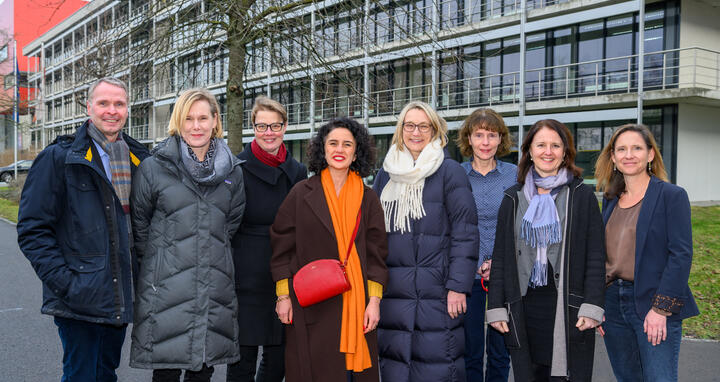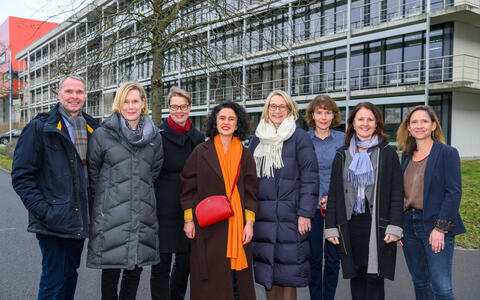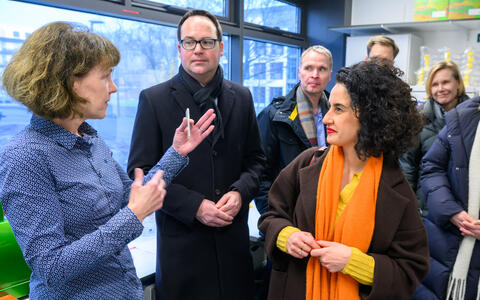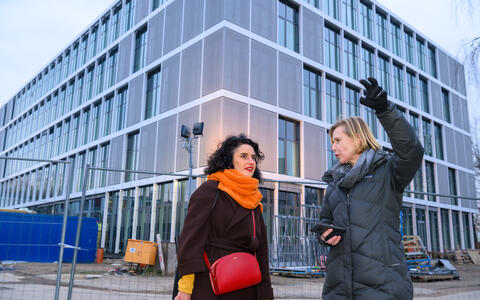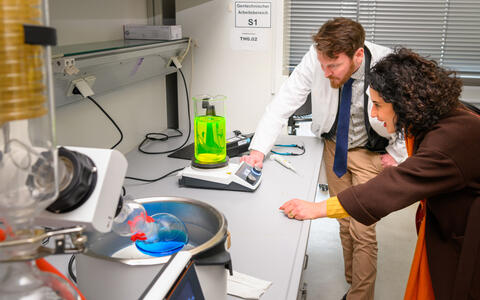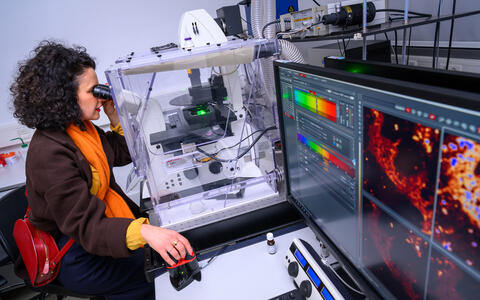State Secretary Naghipour visits Campus Berlin-Buch
As one of Berlin's eleven locations of the future, Berlin-Buch has a high potential for innovation and space. On the biomedical campus, excellent scientists from all over the world are working on the medicine of the future. In the BiotechPark Berlin-Buch, spin-offs from research institutions demonstrate how science can be turned into business.
Berlin's State Secretary for Science, Research and Equality Armaghan Naghipour visited the research campus on February 10, 2023, and discussed the growing potential of Berlin as a healthcare location with scientists and founders. Naghipour was impressed during her tour and said, "The Berlin-Buch Science and Biotech Campus is growing rapidly. It stands for a high density of excellent research institutions and for a successfully grown connection between science and business. This makes it attractive for scientists and start-ups from all over the world. This dynamic is a great benefit for the people in our city and far beyond the borders of Berlin."
Excellent research for health
In Berlin-Buch, research and healing, invention and therapy have been combined for decades. Here, established companies work alongside start-ups in the life sciences, and teams of doctors and researchers work hand in hand. Internationally renowned research institutions such as the Max
Delbrück Center for Molecular Medicine in the Helmholtz Association (Max Delbrück Center) and the Leibniz Research Institute for Molecular Pharmacology (FMP), the Experimental and Clinical Research Center (ECRC,) a joint institution of the Max Delbrück Center and Charité), the Berlin Institute of Health in the Charité (BIH) as well as biotechnology companies and clinics form a network. Building on initial spin-offs in the early 1990s, the campus is now one of the largest biotech parks in Europe. With a clear focus on biomedicine, it represents the entire value chain from discovery to development and production of marketable innovations and has outstanding growth potential.
"Since 1992, more than 600 million euros have been invested in research and biotech infrastructure on the campus by the EU, the federal government and the state, said Dr. Christina Quensel, managing director of the campus' operating company. "Our economic success results in particular from the close connection between basic and clinical research, high-tech platforms and the goal of bringing biomedical findings into application."
New space for start-ups in biotechnology and medical technology is being created in the "BerlinBioCube." The new Gründer:innen center will open in fall 2023 and offer 8,000 square meters of state-of-the-art laboratory and office space. Up to 400 jobs can be created here. Dr. Quensel presented to the State Secretary the plans for the expansion of the campus, the extension of the biotech park to approximately 9 hectares in the immediate vicinity to enable the expansion of companies on site and additional settlement of biotech companies.
Innovative projects and spin-offs
New space for start-ups in biotechnology and medical technology is being created in the "BerlinBioCube." The new Gründer:innen center will open in fall 2023 and offer 8,000 square meters of state-of-the-art laboratory and office space. Up to 400 jobs can be created here. Dr. Quensel presented to the State Secretary the plans for the expansion of the campus, the extension of the biotech park to approximately 9 hectares in the immediate vicinity to enable the expansion of companies on site and additional settlement of biotech companies.
At the Max Delbrück Center, Scientific Director Prof. Maike Sander and researchers Dr. Uta Elisabeth Höpken and Dr. med. Verena Schöwel-Wolf presented two promising spin-off projects. Uta Höpken's research group is using designer immune cells to develop a cellular immunotherapy that can combat leukemias and lymphomas more specifically. The start-up MyoPax of the MDC-Charité team of Prof. Simone Spuler, presented by Dr. Schöwel-Wolf, uses its innovative muscle stem cell technology to develop regenerative therapies for previously incurable muscle diseases. "Driving the translation of scientific discoveries with such great potential for medicine is very important to us. We see ourselves as an innovation driver and support an entrepreneurship culture at the Max Delbrück Center so that the new therapies reach patients quickly," said Maike Sander.
At the Leibniz Research Institute for Molecular Pharmacology (FMP), Director Prof. Volker Haucke presented a current study on an inhibitor for the treatment of thrombosis that could also serve as a lead structure for further drug development. Interdisciplinary work and state-of-the-art technologies for structure elucidation, medicinal chemistry or screening of substances enable such groundbreaking discoveries at the site. "Our highly ranked published work was done together with a group of Prof. Oliver Daumke at the Max Delbrück Center. It is an excellent example to highlight the excellent research approaches also due to the proximity of the research institutes and consequently many scientific collaborations on campus," summarized Prof. Volker Haucke. Chemist Dr. Johannes Broichhagen then presented how his research group exploits isotope effects to develop synthetic (fluorescent) dyes for microscopy.
Finally, State Secretary Naghipour visited the “Life Science Learning Lab”, which offers courses for students as well as professional training and continuing education under one roof.
Text: Christine Minkewitz

